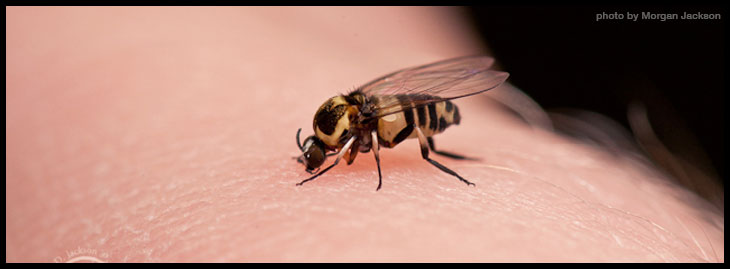Morgan is an entomologist who has found a real love for communicating his passion via podcasts, blogs and social media. If you’re a fellow biologist, you may have been on Morgan’s BreakingBio podcast (or will be sometime soon). He has co-hosted over 100 episodes to date. He’s also an avid nature photographer. I still haven’t met Morgan, but I virtually know him via our connection on twitter. To get to know him better, I asked him these questions.
What insect/bug/arthropod best describes you (or what’s your favorite one(s)?
Definitely a fly. I don’t think I could pick any one species, but as a group I can’t think of anything else that I like more. I’ve always assumed that if I was invited to Hogwarts, my magical Patronus would be a fly (even if it’d be of questionable use in a battle against a Dementor).
What is your “job description”
My “job” is a mix of different things right now. Technically I’m still a student, working towards earning my PhD, but unlike other types of school, I don’t go to classes every day, and actually get paid a salary to learn and come up with new ideas. More broadly, my job is to study nature, particularly insects, and come up with and test hypotheses about how different species are related to each other. I also think that part of my job is to share the things I learn, both my own research and also the work being done by others, and help as many people as I can understand why I love what I do for a living.
What do you study now?
My main study focus is on fly biodiversity and natural history. This means that I’m looking for new species of flies (both out in the wild and also in libraries of biodiversity like museums and natural history collections), giving them names when they need new ones, and then figuring out how they’re related to one another so I can classify them correctly. I’m also interested in watching flies in their natural environments and seeing how they live their lives, what other species they’re associated with, and how their bodies and DNA enable them to survive. I find this mix of taxonomy (discovering and naming species), systematics (figuring out relationships and classification), and natural history (how species fit into ecosystems & survive) constantly inspires my curiosity and creativity, and fuels my desire to learn something new every day.
What is the best thing about your job?
Freedom! Right now I’m lucky to explore new ideas and insects whenever I want to, as long as I can figure out a way to relate it back to my school work.
What is the worst thing about your job?
There’s a bumper sticker that I’ve seen at museums and other biodiversity labs a few times that perfectly sums up the worst part of my job: “So many species, so little time!”. There is just so much to see and learn about flies, insects, and nature that there’s too little time in the day to explore everything.

What inspired you to first study science?
I grew up in a rural community in Canada, and always loved animals. I’d read books about coral reefs, watch nature documentaries on TV about critters from Amazonian jungles and African safaris, and explore the wild areas around my home and cottage. When I went to university, I knew that I wanted to do something with animals, and so I started a degree in Zoology, hoping to one day become a veterinarian. After I got to university, I learned that there were so many more options for working with animals than just being a vet or working on a farm (something else I did growing up), and found that I could actually get paid to be curious and contribute to science. I ended up taking a course on insects in my junior year, got hooked on flies, and haven’t looked back since!
What do you do in a typical day?
Most days I work in a laboratory connected to our insect collection, and spend my time looking at flies under a microscope looking for differences between specimens and species, working on my computer writing down findings and ideas (as well as emails, reading about new research, and checking in with friends and colleagues on social media), gathering and analyzing DNA data, and taking photos to help tell the story of my flies.
Occasionally I get to travel to new places, either to visit a museum to look for new specimens to study, a conference to tell people about my work, or out into the field to observe and collect insects in the wild.
What advice would you give to someone interested in becoming an entomologist?
Stay curious, ask questions, look for insects everywhere you go, and keep good notes about what you see, where and when you saw it, and all the things you learn along the way! A university degree in biology helps, but if you’re passionate about learning and insects, there are plenty of opportunities for anyone to get involved with entomology and make a contribution to our understanding of insects.



































































































